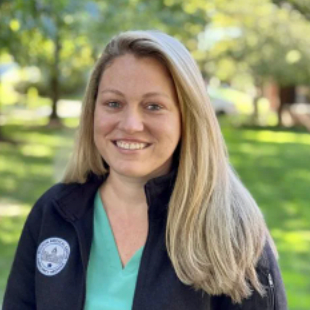Program Director Contact Information

Jessica Corio, PharmD, BCPS, BCEMP
Clinical Specialist – Emergency Medicine
Director – PGY2 Emergency Medicine

Bryan Gendron, PharmD, BCPS, BCEMP
Clinical Coordinator - Emergency Medicine
Coordinator – PGY2 Emergency Medicine
We will be having in-person interviews for the 2024-2025 recruitment cycle.
Program Description
The Boston Medical Center PGY2 Emergency Medicine pharmacy residency is among the oldest programs accredited through ASHP. This program offers specialized training in emergency medicine pharmacotherapy in one of the busiest emergency departments in the United States and largest level 1 trauma center in the Northeast region. After orientation to the department, the resident begins a series of rotations and other activities designed to meet the goals and objectives of the PGY2 residency in emergency medicine. Rotation options include emergency medicine, emergency department administration, pediatric emergency medicine & pediatric intensive care, and adult intensive care (medical, trauma/surgical, neuro and cardiac). Longitudinal activities include completion of a research/quality improvement project, medication safety, drug policy development and teaching opportunities. In addition, the resident meets the objectives for hospital practice by participating in the on-call program and independent practice in the Emergency Department.
Learn more about Boston Medical Center's Emergency Medicine Services
Learn more about Boston Medical Center's Critical Care Medicine Services
Program Purpose
PGY2 pharmacy residency programs build on Doctor of Pharmacy (PharmD) education and PGY1 pharmacy residency programs to contribute to the development of clinical pharmacists in specialized areas of practice. PGY2 residencies provide residents with opportunities to function independently as practitioners by conceptualizing and integrating accumulated experience and knowledge and incorporating both into the provision of patient care or other advanced practice settings. Residents who successfully complete an accredited PGY2 pharmacy residency are prepared for advanced patient care, academic, or other specialized positions, along with board certification.
Program Outcomes
- Patient care
- Advancing practice and improving patient care
- Leadership and management
- Teaching, education, and dissemination of knowledge
- Management of medical emergencies
- Management of toxicology patients
Core Rotations (4-5 weeks unless otherwise specified)
- Orientation
- Emergency Medicine I
- May include co-precepting an APPE student
- Emergency Medicine II
- May include co-precepting an APPE student and/or PGY1 resident
- Emergency Medicine III- Evenings
- May include co-precepting an APPE student and/or PGY1 resident
- Emergency Medicine IV- Precepting
- Co-precepting a PGY1 resident
- Emergency Medicine- Overnight (1 week x2)
- Pediatric Emergency Medicine & Pediatric ICU
- Toxicology
- Emergency Department Administration
- Emergency Medical Services (1 week)
- Trauma ICU
- Medical ICU
Elective Rotations (4 Weeks - Choice of 1)
- Infectious Diseases-Consult Service
- Infectious Diseases-Antimicrobial Stewardship
- Cardiac ICU
- Addiction Medicine Consult Service
- Neurocritical Care
Longitudinal Responsibilities
- Longitudinal research or IHI quality improvement project supported by the scholarship committee
- Receive an IHI Basic Certificate in Quality and Safety
- Final manuscript submission
- Medication safety
- Medication guideline development or revisions
- Information systems support (e.g. CPOE, smartpump, ADC, Lexi-Comp) improvements
- Medication Use Evaluations (MUE)
- Pharmacy and Therapeutics committee participation
- Completion of the Institute for Healthcare Improvement basic certificate in quality and safety
- Participation in emergency responses (e.g. code blue, code stroke, rapid response, and trauma room care)
- Emergency Department Policies and Procedures Committee participation
- Code Committee participation
- Emergency Department Executive Committee participation
- Participation in a BMC residency committee
Teaching Responsibilities
- 1 resident case conference or pharmacy M&M conference
- 1 case conference as preceptor to PGY1 resident
- 1 ACPE-Accredited Continuing Education (CE) lecture
- 3 In-services to nurses, physicians, and/or pharmacists
- 1 Emergency Medical Services lecture
- 1 Emergency Medicine conference lecture (Grand Rounds)
- 1 clinical pearl presentation at the New England Critical Care Symposium (5 minutes)
- Code blue simulation participation
- Co-precepting APPE students & PGY1 residents on rotation
Additional Opportunities
- Resident Teaching Certificate
- Resiliency Training
- Development or revisions of monographs, policies, or guidelines
- Code blue simulation participation
- Emergency preparedness training at the Center for Domestic Preparedness
- American Academy of Clinical Toxicology journal club webinar (30 minutes, if selected)
- American Academy of Clinical Pharmacy ED PRN online journal club (30 minutes, if selected)
- Journal Club presentations
- Chief Resident opportunity
Pharmacy Practice (Staffing) Responsibilities
- One week of ED evening staffing every 8 weeks and staffing one weekend in the ED every 3 weeks
- Holiday assignments
- 1 major (Thanksgiving Day, Christmas Eve, Christmas Day, New Year's Eve, New Year's Day)
- 1 minor (Memorial Day, Labor Day, Martin Luther King Day)
Benefits
- Estimated Salary: $63,000
- Vacation time: 12 days
- Office space with computer
- Travel/CE allowance (~$2,600/year): ASHP Midyear Meeting, SCCM, or other opportunities for additional national specialty meetings (e.g. North American Congress of Clinical Toxicology, American College of Emergency Physicians, Society of Academic Emergency Medicine, or American College of Medical Toxicology)
- $750 cafeteria allowance per academic year
- $1000 move/licensure bonus
- Lease guarantee available to minimize security deposit requirements
- Insurance Benefits: health (100% employer-paid option), dental, vision, disability, accidental death and dismemberment, life insurance
